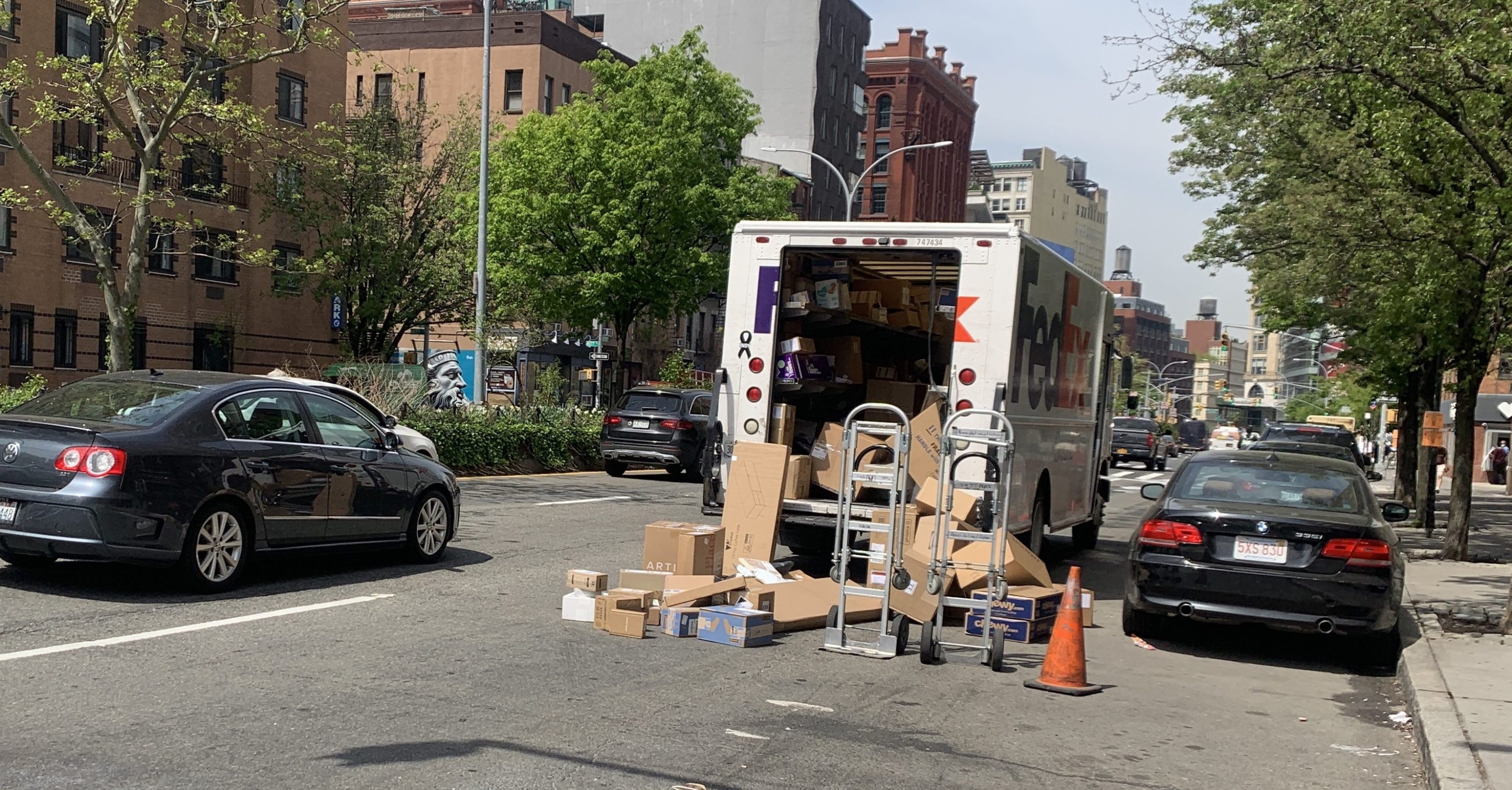E-commerce has become a crucial part of New York City’s economy, but double-parked delivery trucks cost more than $240 million in pollution and lost productivity, a new Columbia University report revealed.

Commissioned by Open Plans, the Columbia’s School for Professional Studies report, “Estimating the Environmental Impact of the Shift to E-Commerce in New York City,” found that a single double-parked delivery truck on average affects 43 cars, which not only adds .06 grams of particulate matter (PM2.5) to the air, but delays all the drivers more than two minutes. And in this city, time is indeed money; those delays cost the city over $243 million every year, the report estimates.
“The time that you could be spending [or] earning money, you're actually spending waiting in traffic was more than $243 million in a year,” said Jordan Goldstein, the report’s project manager. “So the New York City economy is losing that much money a year, which could be basically alleviated by increasing transit efficiency.”
The premise behind the report is simple: When a delivery vehicle is double-parked, cars unable to pass form a queue, generating extra exhaust in the process.
Congestion levels vary throughout the day, but the report is clear that even one vehicle can have a profound impact. In one instance, a double-parked e-commerce vehicle affected 50 other vehicles behind it, adding 3.31 minutes to each car’s commute, or 165.5 minutes combined. Another posed problems for 73 cars, each waiting an additional 3.23 minutes — 235.79 total minutes.
Some trucking companies have shifted their vehicle fleet to electric, but that won't change the delays that drivers will experience, Goldstein said. “People are still sitting in cars stuck behind trucks that are double parked,” he said. The study does not even address whether those trucks are idling, which makes the $243-million cost estimate conservative, Goldstein said.
The study offered one counter-intuitive finding, suggesting that widespread implementation of loading zones, off-hour deliveries, or a curb reservation system won't be effective as reducing truck vehicle miles traveled.
Instead, the study recommends a solution that would take many van and truck trips out of the equation altogether: microhubs.
"By centralizing delivery hubs and shifting them closer to city centers, the need for large delivery trucks could be reduced," the study argued. "This proposed policy intervention aims to facilitate e-commerce delivery processes that reduce the harmful impacts on metropolitan traffic flow and the environment."
London is betting heavily on microhubs, projecting that by 2030, 17 percent of all delivery trucks will be replaced by bicycles, removing 30,000 tons of carbon-dioxide from the air. Like New York, London hopes to expand its use of the river (and we have two of those) to move freight.
Goldstein said microhubs “seemed the most feasible" of all possible freight-traffic-reduction strategies because it works, is relatively inexpensive to implement and causes the most disruption of the current, flawed system.
"It requires probably the least investment in enforcement for the city itself,” he added. “Maybe you'll lose a little bit of efficiency, but these companies like Amazon already allocate in their budgets the money they're going to spend annually to pay double-parking tickets.”
Manhattan Borough President Mark Levine and the Department of Transportation see the merit, too, despite potential zoning challenges: The agency announced a microhub pilot program last year (though it has yet to get off the ground — a DOT spokesperson said the agency is in the process of selecting and launching sites).
Still, the report acknowledged there is no single fix: “Solutions to the double-parking problem will have to be multifaceted,” it reads, “there is not a one-fits-all solution that will effectively remove all delivery trucks without significant disruption to the status quo.”






